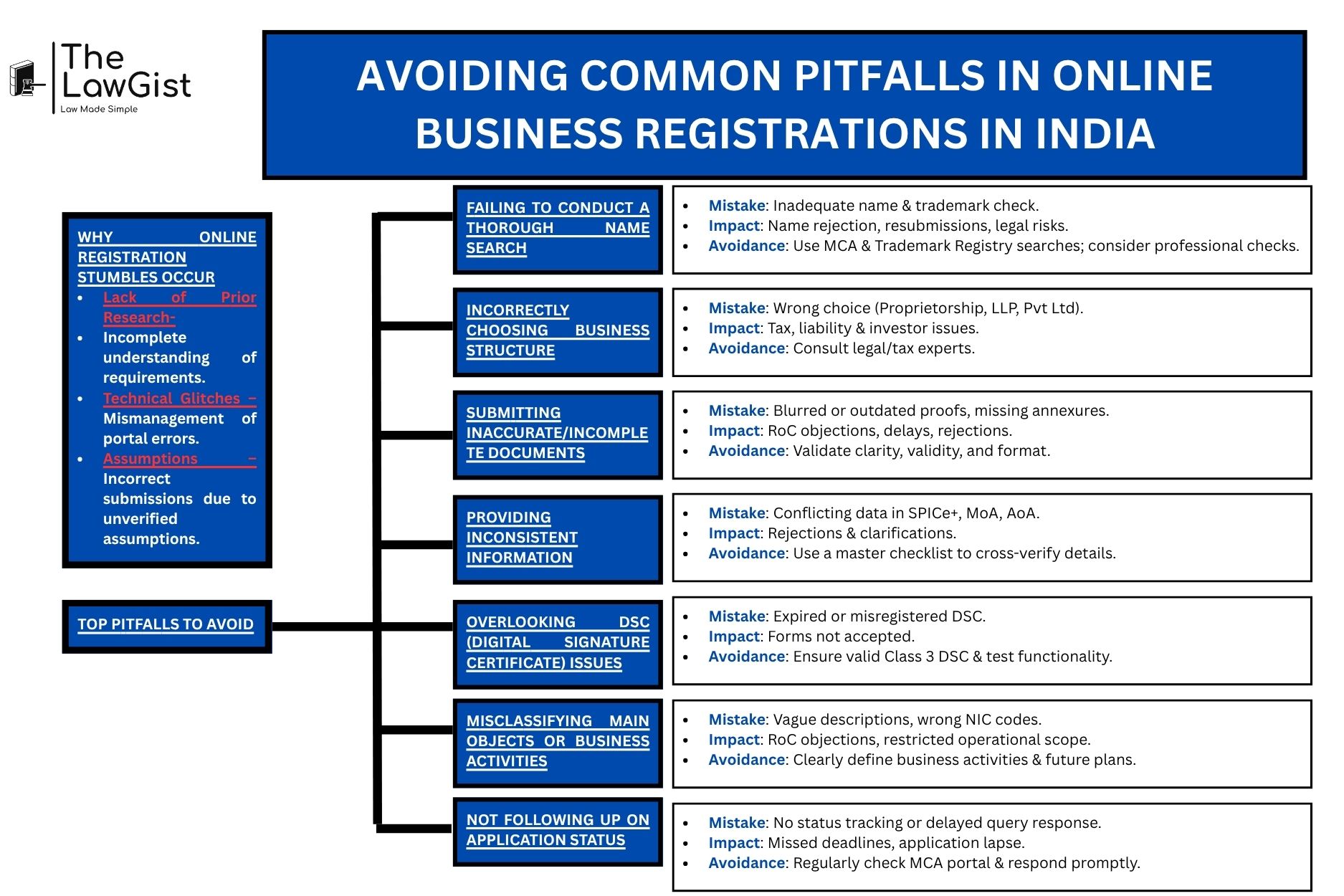
Entrepreneurs navigating the online business registration process on India’s MCA website.
India’s digital revolution has dramatically simplified online business registration, making it faster and more accessible than ever before. However, while the process is streamlined, entrepreneurs often stumble over common pitfalls that can cause significant delays, rejections, or even legal complications down the line.
Understanding and actively avoiding these mistakes ensures a smooth, efficient, and successful online company formation for your new venture.
Why Online Registration Stumbles Occur
Despite user-friendly portals like the Ministry of Corporate Affairs (MCA) website, several factors contribute to common errors:
- Lack of Prior Research: Entrepreneurs often jump into the application without fully understanding the requirements or conducting essential pre-registration checks.
- Information Overload: The sheer volume of information and compliance details can overwhelm new business owners, leading to oversight.
- Technical Glitches: While improving, online portals can occasionally experience technical issues, which users sometimes misinterpret or mishandle.
- Assumptions: Assuming certain aspects of the process or eligibility criteria without verification leads to incorrect submissions.
Top Pitfalls to Actively Avoid
Successfully registering your business online in India requires careful attention to detail and proactive measures. Steer clear of these frequently encountered mistakes:
Failing to Conduct a Thorough Name Search:
-
- The Mistake: Many entrepreneurs only perform a cursory check for their desired company name. They fail to conduct comprehensive trademark searches or check similar-sounding names across all relevant classes.
- The Impact: This often leads to name rejections by the Registrar of Companies (RoC) due to similarity with existing companies or trademarks, forcing time-consuming resubmissions. It can also lead to future trademark infringement lawsuits.
- How to Avoid: Always perform extensive searches on the MCA portal (for company names) and the Indian Trademark Registry (for trademarks). Consider professional help with RegisterKaro for a more exhaustive search that covers phonetic similarities and different classes.
Incorrectly Choosing Your Business Structure:
-
- The Mistake: Entrepreneurs frequently select a business structure (e.g., Proprietorship, LLP, Private Limited Company) without fully understanding the long-term implications for liability, taxation, compliance burden, and fundraising potential.
- The Impact: An ill-suited structure can result in higher taxes, unlimited personal liability, or difficulties attracting investors later on. Changing structures post-registration is complex and costly.
- How to Avoid: Consult with a legal and tax expert before registration. They help you analyze your business goals, risk appetite, and capital requirements to recommend the most appropriate legal entity.
Submitting Inaccurate or Incomplete Documents:
-
- The Mistake: This is a rampant issue. Applicants upload blurred identity proofs, outdated address proofs, incorrect copies of utility bills, or omit mandatory annexures.
- The Impact: The RoC will issue objections, demanding resubmission and significantly delaying the entire registration process. Repeated errors can even lead to application rejection.
- How to Avoid: Double-check every document against the MCA’s specified requirements. Ensure clarity, validity, and correct file formats. Cross-verify all personal details with government IDs.
Providing Inconsistent Information Across Forms:
-
- The Mistake: Different sections of the SPICe+ form or linked forms (like MoA and AoA) sometimes contain conflicting information regarding addresses, director details, or business objectives.
- The Impact: The RoC flags these inconsistencies, leading to immediate rejections or prolonged clarification processes.
- How to Avoid: Maintain a master checklist of all company and director details. Cross-reference every field across all forms and attachments before final submission.
Overlooking Digital Signature Certificate (DSC) Issues:
-
- The Mistake: Applicants use expired DSCs, DSCs registered under an incorrect name, or face technical difficulties in attaching them to e-forms.
- The Impact: The system will not accept the digitally signed forms, halting your application.
- How to Avoid: Ensure all proposed directors have valid Class 3 DSCs registered under their correct names. Test the DSC functionality before attempting to sign forms.
Misclassifying Main Objects or Business Activities:
-
- The Mistake: Entrepreneurs often provide vague or inaccurate descriptions of their company’s main business objects in the Memorandum of Association (MoA) or select incorrect NIC codes.
- The Impact: This can cause the RoC to raise objections, or worse, limit your company’s future operational scope. You might face legal hurdles if you expand into activities not explicitly mentioned.
- How to Avoid: Clearly define your primary business activities and any foreseeable future expansions. Consult with a professional like RegisterKaro to ensure your MoA adequately covers all intended operations and you select the precise NIC codes.
Not Following Up on Application Status:
-
- The Mistake: Submitting the application and then simply waiting, without regularly checking the status on the MCA portal or responding to RoC queries.
- The Impact: You miss crucial deadlines for responding to objections, leading to application lapse or rejection.
- How to Avoid: Regularly log into the MCA portal and check your application status. Set reminders for any deadlines communicated by the RoC. Respond promptly and comprehensively to all queries.
Navigating online business registration in India is a straightforward process when you approach it systematically and meticulously.
Conclusion
By recognizing and proactively avoiding these common pitfalls, you significantly increase your chances of a quick and successful company formation, allowing you to focus on what truly matters: building your business.
“This blog has been authored by Rajesh Yadav, and we do not claim ownership of its content. It is shared here solely for informational purposes.”






